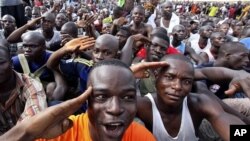Ivory Coast is teetering closer and closer to a return to civil war, as Laurent Gbagbo continues to cling to power nearly four months after a presidential election that the United Nations and much of the international community say he lost to rival, Alassane Ouattara.
Thousands of pro-Gbagbo youth waited outside army headquarters in Abidjan Monday morning to join the nation's military, which has been involved in heavy fighting with forces loyal to Mr. Ouattara.
They are responding to a call to enlist from Charles Ble-Goude, leader of militant group The Young Patriots, who has been accused of inciting attacks against civilians and U.N. peacekeepers.
Addressing a Young Patriots rally Saturday, Ble-Goude asks the youth of the country if they are ready to join the army to serve their country to which the crowd responds, shouting "We want to free Ivory Coast!"
The United Nations says 30 civilians were killed in a mortar attack Thursday on a market in Abobo, a pro-Ouattara neighborhood of Abidjan that has become a focal point of violence.
U.N. Human Rights chief, Navi Pillay, says those shelling attacks by forces loyal to Gbagbo may amount to crimes against humanity.
Gbagbo's government denies any involvement in that attack, saying the United Nations mission in Ivory Coast is not credible because it is backing pro-Ouattara rebels.
The United Nations says 435 people have been killed and another 450,000 forced from their homes since the crisis began.
Thousands fleeing the violence in Abidjan gathered at its main bus station Sunday. Weighed down by suitcases full of whatever belongings they could carry, many had to push and shove their way onto crowded buses.
Standing in a bus shelter, civil servant, Adama Diawara, says they are leaving Abidjan now. He says with the mortars falling on them, on their roofs, day and night, they don't know what to do. He says they are tired and the international community must help them.
Ticket sellers were taking advantage of the situation by buying up bus tickets and then charging double.
Aicha Diabate says they've been waiting since the day before yesterday and only just managed to get a ticket for 2 a.m. She says now they cannot get into the bus to Bouake because people who do not have tickets are paying the driver extra to get on.
The heaviest fighting has taken place in Abidjan, but clashes have also taken place in the country's troubled West, where northern rebels loyal to Ouattara have pushed south.




